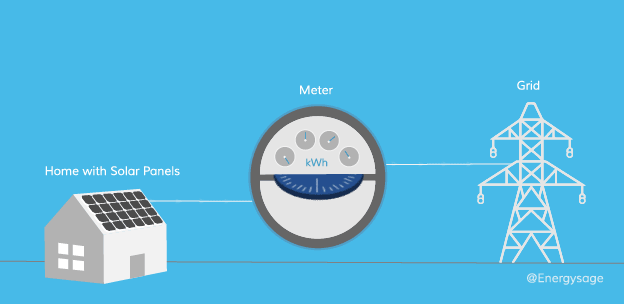What You Should Know About Net Metering in Massachusetts (2024)
As we stride into the heart of 2024, Massachusetts homeowners continue to play a crucial role in the state's commitment to renewable energy. One of the key initiatives empowering residents to embrace clean energy is the Net Metering Program. In this post, we'll delve into the intricacies of the program, exploring how it works and the benefits it offers to those who choose to harness the power of the sun.
What is Net Metering?
Net metering is a billing arrangement that allows homeowners with solar panel systems to receive credit for the excess electricity they generate and feed back into the grid. In simple terms, when your solar panels produce more energy than your home consumes, the surplus is sent back to the grid, and you earn credits on your electricity bill.
How Does it Work?
If you have Eversource, National Grid, or Unitil as your electrical utility, you can take advantage of net metering.
Imagine your home with solar panels on the roof. As these panels soak up the sun's rays, they generate electricity. Any surplus electricity that you don't use immediately gets fed back into the grid, and here's the beauty of it – you get credited for it! These credits are like virtual dollars that accumulate over time, effectively reducing your overall energy costs.
Homes equipped with solar panels will also have bi-directional (or net) meters. These meters measure the electricity flowing in both directions — into your home when you need it and back to the grid when you’re generating surplus energy.
How Does it Work During the Winter?
It’s true that your solar array won’t produce as much energy during the winter, but that’s where the benefit of net metering really comes into play! The surplus credits you generate during the spring and summer months can now be used to offset your energy costs when the solar panels aren’t producing enough energy, such as during the winter, at night, or on cloudy days.
Financial Benefits for Homeowners
One of the most appealing aspects of the net metering for homeowners is the significant financial benefit it brings. By participating in this program, you can see a substantial reduction in your electricity bills. The more energy your solar panels produce, the more credits you accumulate, translating into more savings for you. It's a win-win situation – you save money while contributing to a sustainable energy future.
Steps to Get Started
Choose your Installer: Find a reputable solar installer to set up solar panels on your property.
Connect to the Grid: Your solar panels will be connected to the electrical grid, allowing excess energy your system generates to flow back to the grid.
Offset Your Bills: Use these credits to offset your future electricity bills and enjoy the benefits of your solar investment!
As we navigate the ever-evolving landscape of renewable energy, the net metering program in Massachusetts stands as a beacon of progress. For homeowners, it's not just about saving money—it's about making a positive impact on the environment and contributing to the collective effort towards a sustainable and clean energy future. Embrace the power of the sun, harness it for your home, and let net metering be the bridge to a greener tomorrow.

